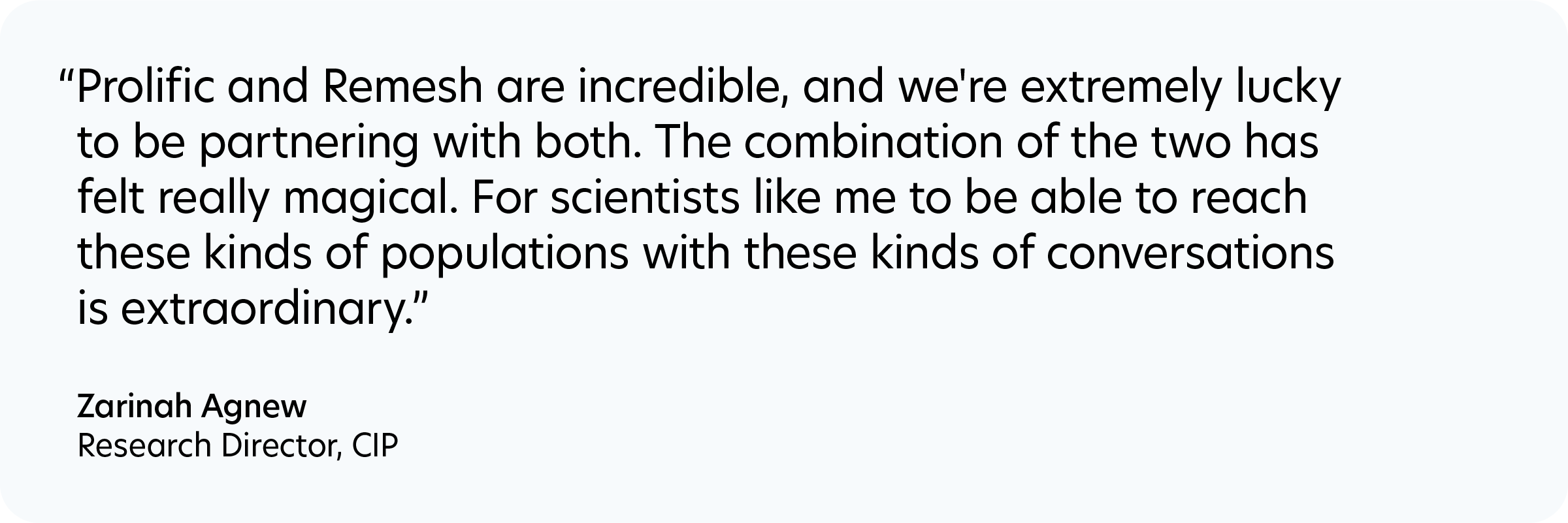How the Collective Intelligence Project is democratizing AI development with global human perspectives

A partnership bringing voices from 70+ countries into the heart of AI governance.
The challenge: AI development happens in Silicon Valley, but AI impact is global
Artificial intelligence is reshaping our world, yet the vast majority of AI development happens in a handful of tech hubs, primarily Silicon Valley. While frontier model developers are aligning models based on human feedback, most feedback comes from limited demographics because of over-reliance on small, hired labeling and annotation teams.
It’s a reality that creates a fundamental disconnect between who's building AI and who's living with its consequences.
The Collective Intelligence Project (CIP) is a nonprofit R&D lab focused on collective intelligence solutions, and it recognizes the vast gap. That’s why it set out to change it. Its mission is to connect the global public directly to the centers of power in the AI ecosystem.
"Most of the global majority have no say about what's happening in the AI ecosystem," explains Zarinah Agnew, Research Director at CIP. "AI is a transformative technology changing our world at a pace we can't even keep up with, and we wanted to get broad reach on these opinions fast."
The vision is ambitious: create an ongoing conversation between everyday people worldwide and the AI labs, governments, and organizations shaping our AI-powered future. But translating this vision into reality requires solving a complex logistical challenge. For instance, how do you gather regular, meaningful input from a truly global audience, without spending years and millions of dollars on traditional research methods?
The solution: Global Dialogues powered by Prolific’s global representative sample and Remesh’s conversational platform
The answer came in the form of Prolific and its ability to offer a unique global representative sample capability that could tackle exactly the challenge head-on. Combined with Remesh AI's conversational research platform, CIP could finally create the kind of global dialogue they envisioned.
Thanks to Prolific and Remesh, CIP was able to launch Global Dialogues. It’s a groundbreaking project that brings together 1,000 participants from over 70 countries every two months for in-depth conversations about AI’s role in society.
Using Remesh’s live conversational platform, these sessions go far beyond traditional research. They allow CIP to have a rich, open-ended dialogue with 1,000 global participants, surfacing a wide range of human perspectives on AI development in real-time and across language barriers.

The project launched publicly at the AI Summit in Paris and has already reached thousands of people globally. Each dialogue builds on the previous one, creating an evolving conversation that grows more sophisticated over time.
Throughout 2025, Global Dialogues are scheduled every two months, running punctually with clear submission and launch deadlines for continuous global feedback.
How Prolific and Remesh create a unique solution
CIP had to ensure every voice could be heard, compared, and understood in real-time.
That’s why they chose Remesh – which has also been used by OpenAI to develop its policies, and by the UN to run deliberative dialogues in conflict zones – because of its ability to find live consensus across a global population.
Remesh's online experience can host up to 1,000 people for a single live conversation. Thanks to simple voting exercises and Remesh's proprietary predictive algorithm, moderators running the session can see the open-ended responses ranked by consensus. This surfaces powerful live insights and shared human values across cultures and languages.
They had the platform to capture insights. Now they needed the participants.
To make Global Dialogues truly global, they had to reach thousands of participants across the world in a way that’s proportionally representative and logistically viable.
This wasn’t something legacy panel providers, designed mostly for static or Western-centric research, could support. They lacked both the flexible infrastructure and the global reach to meet this kind of recurring, dynamic sampling need.
The alternative option was juggling multiple vendors – a slow and expensive route, navigating different payment systems and waiting months for results. CIP needed something fundamentally different.
That difference came from Prolific.

To make it work, Prolific devised a custom approach. They onboarded entirely new geographies, navigated the limits of country-level access, and designed a novel stratification strategy that grouped countries into regional strata based on global population proportions. For example, if 8.5% of the world’s population lives in Southeast Asia, then 8.5% of the sample will be recruited from Southeast Asian countries.
Study access varied by region. In regions where participants were harder to reach, participants from any country in the region could access studies on a first-come, first-served basis. In regions with high participant populations, the sample was carefully stratified by sex and country. This balancing act between geographic precision and operational scalability is what enables Global Dialogues to capture a credible slice of global sentiment.
Prolific’s bespoke methodology and platform delivered:
- 1,000 participants from across the world, stratified by region, population size, and demographics
- Complete datasets in weeks, not months
- Reliable data quality through rigorous verification
- Easy payment management for all geographies
- Managed services support so researchers can focus on analysis and design
- Seamless integration with Remesh’s conversational platform
Together, Prolific and Remesh give CIP a scalable, repeatable way to run meaningful, globally inclusive conversations about AI. And it’s at a pace and level of nuance that traditional research methods can’t match.

How it works: step-by-step
The Global Dialogues workflow showcases how modern AI research can operate at a global scale:
1. Question design and cultural adaptation
CIP designs conversations around important AI topics, from system prompts and AI personality to intimate human-AI relationships. Each dialogue includes demographic tracking and longitudinal indicators to monitor how public opinion evolves.
2. Translation and localization
Questions are translated into seven languages using both automated translation and human cultural adaptation for a nuanced, regionally appropriate language.
3. Pilot testing
For the first iteration, run a small-scale pilot with 20 participants to validate timing, question flow, and technical integration before global launch.
4. Global deployment
Prolific's managed services team – including specialists trained specifically for the CIP partnership – handles the complex coordination of launching across 70-plus countries simultaneously, with participants connecting to the Remesh Live platform.
5. Real-time data collection
Participants engage in 30-minute conversations that feel more like dialogues than traditional research, thanks to Remesh’s live, conversational platform. Open-ended responses, real-time voting, and consensus-building around nuanced statements all contribute to richer, more contextual insights that traditional research methods often miss.
Remesh’s real-time translation capability enables participants from seven different language groups to speak, respond, and react in their native languages, while the platform automatically translates their contributions for everyone else. This makes the process far more efficient and allows insights that cut across cultural boundaries.
The entire process – from question design to preliminary results – takes just one to two weeks on average. For context, traditional global research of this scale typically requires three to six months and significantly higher costs.

The results: From global insights to real-world impact
Global Dialogues has already engaged thousands of people across five rounds, with more currently planned. Each session has surfaced rich, culturally varied perspectives on AI, with participants offering thoughtful reflections on topics like end-of-life care or AI personality, often finding common ground across borders.
These conversations reveal a shared global interest in how AI is shaped, and they’re already informing real-world change. Some of the insights uncovered from the first three conversations include:
- AI is everywhere and helping: About half of people use AI daily by choice (work/home), and 71% feel AI has already made their lives better.
- Trust imbalance: People trust their AI chatbots (58%) much more than their elected representatives (30%).
- The emotional AI paradox: While 55% express concern about forming intimate connections with AI, nearly half are already using AI for emotional support weekly. This highlights a growing "emotional underground economy."
The data is being used by AI labs to test alignment with public values, shared at policy forums, and made openly available through the Global Dialogues Challenge for broader research use.
Most importantly, CIP and Prolific’s ongoing partnership throughout 2025 ensures the input continues to grow in depth and relevance. Together with Remesh, they’ve created a fast, scalable model for inclusive AI governance, one that proves meaningful public input doesn’t have to be slow or expensive.
As Zarinah puts it: “People all over the world have meaningful things to say. Our hope is that this becomes a sustainable way to bring diverse perspectives into how AI is built.”
Ready to gather global human perspectives for your AI research? Contact our team to learn how Prolific's global representative sample can support your research objectives.








